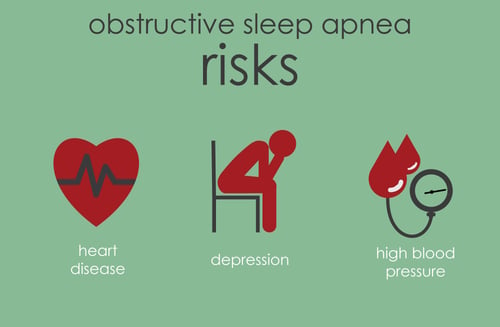Individuals who struggle with diabetes could also be struggling with obstructive sleep apnea (OSA). Over the past two decades, more research has illuminated the fact that many symptoms of diabetes are common to those in OSA. These similarities include:
-
Metabolic conditions
-
Obesity
-
Glucose intolerance
-
Cardiovascular complications
Because both OSA and diabetes present many of the same symptoms, untreated OSA can significantly aggravate diabetes risk factors if OSA is left untreated. Fortunately, there are paths to a diagnosis and a variety of OSA treatment options available that can alleviate symptoms and potentially save lives for those suffering from OSA and diabetes.
What is Obstructive Sleep Apnea?
Obstructive sleep apnea is a condition that occurs when no air enters the lungs during inhalation. This usually happens because either the tongue or enlarged tissues push up against the back of the throat, blocking the airway.
Those most affected by OSA include back sleepers, obese, middle-aged, and males. OSA is the most common type of sleep apnea.
To diagnose OSA, an individual must exhibit the presence of sleep-disordered breathing and other associated symptoms during a sleep study, which detects these conditions.
Symptoms of Obstructive Sleep Apnea
Individuals with OSA often experience:
-
Loud snoring
-
Breathing cessation during sleeping
-
Dry mouth or sore throat upon waking
-
Morning headaches
-
Daytime sleepiness
-
Impaired neuropsychological functioning
-
Impaired cognitive functioning
Approximately 12-18 million people in the United States alone suffer from OSA.
Risk Factors of Obstructive Sleep Apnea

In addition to reduced quality of life, those diagnosed with OSA are at risk for:
-
Hypertension (high blood pressure)
-
Depression
-
Cardiovascular disease
-
Impaired glucose metabolism.
Furthermore, recent studies indicate that up to 50% of individuals with OSA have type 2 diabetes. In conjunction, approximately 50% of those with type 2 diabetes have moderate to severe OSA.
Role of Obesity in OSA and Diabetes
The connection between OSA and diabetes has been known since 1981. A study conducted by PJ Rees concluded that a large percentage of those with diabetes had high incidents of sleep-breathing disorders. In the past twenty years, studies have continued to support a relationship between OSA and diabetes.
As OSA becomes more severe, diabetics may experience increasing problems with both:
-
Insulin resistance
-
Glucose intolerance
1 in 3 patients with OSA will develop diabetes. Research suggests that a common link between OSA and diabetes stems from obesity. This is likely due to the excess tissue that obese individuals develop around the neck which can lead to obstructive sleep apnea. Obesity and OSA also cause chemical imbalances that can trigger or worsen existing diabetes.1
The unspoken implication of this research may be that weight control can play a significant role in preventing both OSA and diabetes.
The Role of Metabolic Syndrome in OSA and Diabetes
Another link between OSA and diabetes is Syndrome X. Syndrome X, also known as “metabolic syndrome” or “insulin resistance syndrome,” is characterized by cardiovascular risk factors caused by insulin resistance. This insulin resistance has been linked to both type 2 diabetes (90% of people diagnosed with type 2 diabetes demonstrate insulin resistance). OSA is also strongly correlated with:
-
Insulin resistance
-
Hypertension
-
Central obesity
In plain terms, many people who struggle with OSA have health risk factors (Syndrome X) that are very similar to people with diabetes.
OSA Evaluation With a Sleep Study
Since obstructive sleep apnea is so often present in individuals diagnosed with diabetes, diabetics who are experiencing possible symptoms of sleep apnea are highly encouraged to get a sleep study.
The Anchorage Sleep Center provides comprehensive sleep studies that can help diagnose sleep disorders that could be aggravating diabetic symptoms.
To read more about types of in-lab sleep studies, the process of a sleep study, and what happens afterward, read our post on what to expect during a sleep study. Scheduling a sleep study could lead to life-changing treatments that could improve insulin sensitivity, alleviate symptoms of OSA, and diabetes, and ultimately improve quality of life.
For more information, please click the blue button below to get a sleep medicine consult and speak with one of our sleep health professionals.


